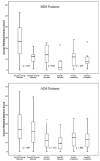Cognitive and psychological impact of BRCA genetic counseling in before and after definitive surgery breast cancer patients
- PMID: 22766984
- PMCID: PMC3878414
- DOI: 10.1245/s10434-012-2460-x
Cognitive and psychological impact of BRCA genetic counseling in before and after definitive surgery breast cancer patients
Abstract
Purpose: To examine changes in cancer-related knowledge, distress, and decisional conflict from pre- to post-genetic counseling (GC) in before (BDS) and after (ADS) definitive surgery breast cancer (BC) patients.
Methods: Sociodemographic and clinical characteristics were collected at baseline; primary outcome data were collected before (T1) and after (T2) pretest GC. Within group changes for cancer-related knowledge, distress, and decisional conflict over genetic testing were compared by Wilcoxon signed-rank tests.
Results: Of 103 BC patients, 87 were ADS and 16 were BDS. Analyses revealed that both groups reported significant increases in knowledge between T1 and T2 (median change 4.2, p = 0.004, and 2.7, p < 0.001, for BDS and ADS patients, respectively). Overall cancer-related distress showed a downward trend between T1 and T2 for both groups and was significant for BDS patients (p = 0.041). Reports of BDS patients trended toward overall and subscale-specific increases in decisional conflict, with the exception of the uncertainty which trended downward, but did not reach significance. Overall decisional conflict decreased in ADS patients, approaching marginal significance (p = 0.056), with significant improvements in informed decision making (median change -12.6, p < 0.001; i.e., pretest GC yielded improved knowledge of benefits, risks, and side effects of available options).
Conclusions: These pilot data suggest that pretest GC increases cancer-related knowledge for both BDS and ADS patients, decreases distress in BDS patients, and improves informed decision making in ADS patients. Future studies with larger sample sizes are needed to replicate these results.
Conflict of interest statement
Figures


References
-
- Graeser MK, Engel C, Rhiem K, et al. Contralateral breast cancer risk in BRCA1 and BRCA2 mutation carriers. J Clin Oncol. 2009;27:5887–5892. - PubMed
-
- Metcalfe KA, Lynch HT, Ghadirian P, et al. The risk of ovarian cancer after breast cancer in BRCA1 and BRCA2 carriers. Gynecol Oncol. 2005;96:222–226. - PubMed
-
- Chen Y, Thompson W, Semenciw R, Mao Y. Epidemiology of contralateral breast cancer. Cancer Epidemiol Biomarkers Prev. 1999;8:855–861. - PubMed
-
- Brekelmans CT, Tilanus-Linthorst MM, Seynaeve C, et al. Tumour characteristics, survival and prognostic factors of hereditary breast cancer from BRCA2-, BRCA1- and non-BRCA1/2 families as compared to sporadic breast cancer cases. Eur J Cancer. 2007;43:867–876. - PubMed
Publication types
MeSH terms
Substances
Grants and funding
LinkOut - more resources
Full Text Sources
Medical
Miscellaneous

